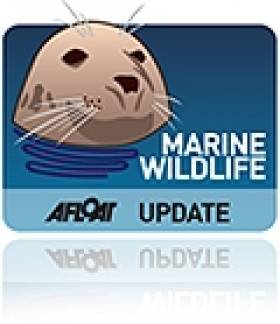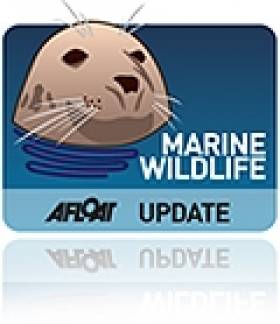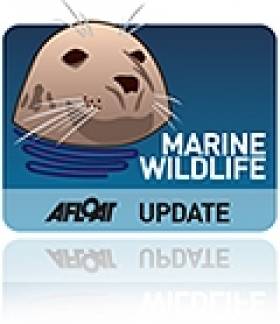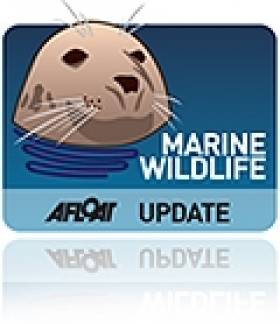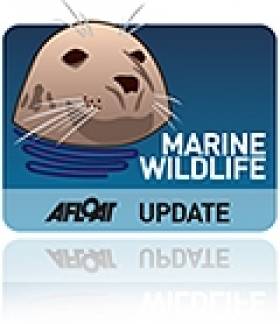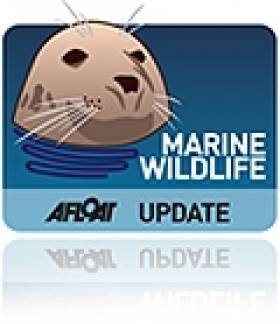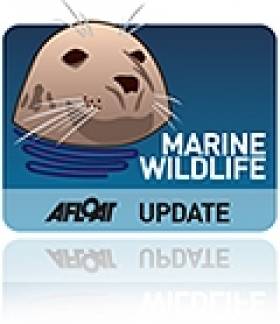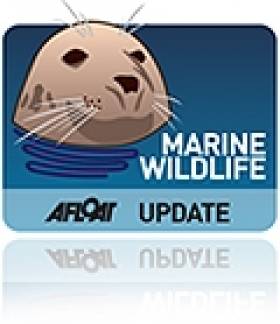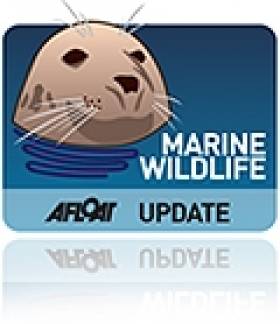Displaying items by tag: marine wildlife
#MarineWildlife - New marine protections for Northern Ireland's waters could provide a further sanctuary for our smallest marine mammal, the harbour porpoise.
As the Belfast Telegraph reports, the proposed Marine Conservation Zone (MCZ) for the area between Belfast Lough and Carlingford Lough would join the Causeway Coast zone protected in 2012.
The news comes some months after the European Commission put pressure on Westminster to designate more protected areas for the smallest of Ireland's cetaceans, whose swimming grounds are being encroached by offshore wind farm development.
And the new proposals for Northern Irish waters also include protections for important seabird colonies as well as an area of seagrass that's vital to local biodiversity.
But the overall scale of the UK's MCZ plans, reduced from more than 100 proposed zones to a total of 50 over the past two years, has been criticised by conservation groups for betraying a 'lack of ambition'.
The Belfast Telegraph has more on the story HERE.
First Basking Sharks Of 2015 Spotted Off West Cork
#MarineWildlife - The first basking shark sightings of 2015 were logged earlier this month, as Ireland's Wildlife reports.
Bridget Healy spotted two of the ocean's second-largest fish from the shore at Ardfield, near Clonakilty in West Cork last Monday 9 March – a little earlier than they usually appear.
But it's still some time off their peak numbers expected between May and June, when the gentle giants might come closer to the shore like one did in Cork Harbour last summer.
Ireland's Wildlife has more on the story HERE.
Marine Wildlife News: Seals Returned To Wild, Dolphin Says Adieu, Irish Sea Life Revealed
#MarineWildlife - Cute by name, cute by nature: Sherkin, Buoy and Splash were returned to the wild after being nursed back to health by the volunteers at Seal Rescue Ireland.
As the Irish Examiner reports, the three young seals – rescued after tips from the public from locations in Cork and Kerry – were rehabilitated over the past three months at the new marine wildlife refuge in Courtown.
But they were finally fit to return to the open water last weekend at Fountainstown beach in Co Cork. The Irish Examiner has much more HERE.
As three return to Irish waters, another says adieu – as Clet the lone dolphin has now been spotted off the Dorset coast, according to the Bournemouth Echo.
Last spotted between Ireland and Scotland's west coast in December, the solitary cetacean first noted in French waters in 2008 appears to have completed a full loop around the island of Ireland.
Along the way he bypassed Dingle's famous resident Fungie and spent a few days in the company of fellow 'dolphina-non-grata' Sandy, also known as Dusty.
Now he's attracting the attention of locals at Portland, south of Weymouth, across the English Channel from his original splashing grounds.
Closer to home, conservationists in the the North West of England have released a video documenting the wealth of wildlife living in the Irish Sea as a reminder to political movers and shakers of the importance of its protection.
Groups such as the North West Wildlife Trusts have criticised Westminster for 'lack of ambition' over the past year since plans for a network of well over 100 Marine Conservation Zones (MCZs) were scaled back to just 27 approvals in November 2013.
More recently a further 23 MCZs were designated proposed, only two of which are out of out of seven proposals covering the waters between Britain's west coast and Ireland (updated Tuesday 17 March).
Woman Dies After Whale Surfaces On Tourist Boat In Mexico
#MarineWildlife - A Canadian woman has died after a grey whale crashed into a tourist boat off Mexico.
As the Globe and Mail reports, the 45-year-old woman, who has not been named, was in a vessel with a group of tourists heading towards port in Cabo San Lucas when the whale suddenly surfaced on top of the boat.
Two other passengers were injured in the incident yesterday (Wednesday 11 March), according to the Guardian – which also highlights the high number of grey whales recorded in the area as of late by Mexican authorities.
Cabo, a resort town on the southern tip of Mexico's Baja Peninsula, is a popular tourist destination for whale watching and getting close to marine wildlife.
Sea Eagle Remains Found In Fermanagh
#MarineWildlife - "A sad end to a beautiful bird" is how the Golden Eagle Trust described the news that remains of a white-tailed eagle were found near Lower Lough Erne in Co Fermanagh earlier this month.
As RTÉ News reports, Ingar was released in Killarney National Park in 2011 as part of a reintroduction programme for the species, also known as the sea eagle.
That same programme saw the introduction of Ireland's first breeding pair of white-tailed eagles in over a century.
Saoirse and Caimin reared their first chicks in 2013, and the birds of prey have proven very popular in Lough Derg, where they relocated from Killarney in 2011.
Ingar's GPS transmitter showed that he had flown to different climes further north, spending the majority of last year on Lough Erne - though it stopped transmitting in December.
Deepwater Whale Strandings Are 'Unusual Mortality Event' – But Sonar Not Confirmed As Culprit
#MarineWildlife - The Irish Whale and Dolphin Group (IWDG) has issued a joint statement with fellow marine wildlife conservation groups on what's been labelled as "an unusual mortality event" involving Cuvier's beaked whales in Scotland and Ireland.
Last month, scientists in Scotland said they were baffled by the "unusually large number" of strandings of the deep-water whale species, rarely seen because they feed so far below the surface.
More recently, the Sunday World reported on further strandings on beaches around Ireland – leading some experts to point the finger at the suspected use of sonar in the British navy's alleged search for a rogue Russian submarine at the end of last year.
The joint statement says there are "many case studies from the Atlantic and Pacific Oceans and Mediterranean Sea where mass strandings of this species were linked to exercised using military sonar.
"Furthermore, a controlled exposure experiment has demonstrated prolonged reactions by some beaked whale species to navy sonar."
However, only anecdotal evidence of any naval sonar activity in the affected areas exists, and the Naval Service has told The Irish Times that it had no knowledge of any such activity over that period.
Similarly, the Department of Energy said no seismic surveys had been conducted offshore since October, and that any such surveys – a significant source of underwater noise that can be harmful to cetaceans – must comply with National Parks and Wildlife Service Guidelines.
The Irish Times has more on the story HERE.
Belfast Lough Bird Reserve Reopens Tomorrow
#BelfastLough - Belfast's Window on Wildlife is the new name for the RSPB's nature reserve on Belfast Lough, which reopens tomorrow (Wednesday 18 February).
As Birdwatch reports, the opening comes after an extensive refurbishment project that will allow visitors to have even better views of the various species of seabirds and water fowl that use the reserve for feeding and breeding.
The new visitor and interpretive centre offers panoramic views of the lagoon, with binoculars and telescopes available – not to mention RSPB staff to help with identifying species.
RSPB members, meanwhile, will be able to benefit from new hides allowing for stunning close-up photography.
And later in spring, a sand martin bank and a swift tower will be installed to provide new homes for those important birds.
Birdwatch has much more on the story HERE.
Interactive Video Sheds More Light On Humpback Whale Mystery
#MarineWildlife - The mysteries of Ireland's humpback whales have got the 'TouchCast' treatment as part of RTÉ's new interactive storytelling format.
As previously reported on Afloat.ie, scientists have recently tracked first the firm time ever whales travelling between popular spots on the Irish coast like Hook Head and feeding grounds thousands of miles way in the Arctic.
Now you can learn more about this new research in Philip Bromwell's TouchCast report, including cetacean experts' surprise at finding no matches between Irish whale and the popular breeding grounds in the mid Atlantic and the West Indies.
Another RTÉ TouchCast report worth watching pays a visit to the studios of Cartoon Saloon, nominated for an Oscar for their animated feature Song of the Sea that takes its inspiration from Irish maritime folklore.
New Zealanders Rush To Aid 200 Whales In Mass Stranding
#MarineWildlife - Locals have been astounded by a mass stranding of up to 200 pilot whales in New Zealand.
According to the Irish Independent, volunteers were yesterday (13 February) fighting to save the whales that were still alive after beaching along a 7km stretch of sand at the north end of New Zealand's South Island.
The death toll was last put at around 25, and while some other were reportedly refloated, they were said to be "swimming in a confused fashion" as the Guardian reports.
Farewell Spit, where the stranding has occurred, is said to be a 'whale trap' for its numerous cases of cetacean strandings - bringing to mind the recent "unusually large number" of whale beachings in Scottish and Irish waters.
Real-Life 'Hunt for Red October' Linked To Beaked Whale Strandings
#MarineWildlife - Could the recent mass strandings of Cuvier's beaked whales in British and Irish waters be connected with the recent real-life 'Hunt for Red October'?
Last month scientists in Scotland were baffled by an "unusually large number" of strandings of the deep-water whale species, rarely seen because they feed so far below the surface.
And as the Sunday World reports, even more have been found washed up on beaches around Ireland since then, amid an alarmingly high rate of cetacean strandings for the start of this year that includes the killer whale beached in Waterford last week.
While the recent severe weather systems from the Atlantic have been suggested as a possible cause, another culprit might be the British navy's search for a rogue Russian submarine at the end of last year.
Mick O’Connell of the Irish Whale and Dolphin Group (IWDG) says that loud sonar such as that used to detect submarines can distress deep-diving whales into surfacing too fast and getting 'the bends'.
It's believed that all eight of the beaked whales washed up in Ireland died in the same incident.
Though their actual cause of death cannot be determined, decompression sickness has been suggested as reason for the earlier Scottish whale deaths.
The Sunday World has more on the story HERE.


























